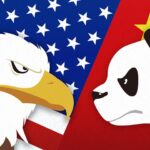Famed scientist Albert Einstein once said, “Insanity is doing the same thing over and over again and expecting different results.”
The Biden administration now certainly loves issuing more and more tariffs and economic sanctions against China. Each time they do so, they want American and global audiences to believe that such actions align with America’s longstanding belief in free trade and that these tariffs and sanctions work.
However, the truth is that they are not consistent with free trade and they do not work.
The latest set of tariffs from the White House, which occurred just a few days ago, target a range of Chinese goods, including electric vehicles (EVs). Chinese-made EVs would face 100 percent tariffs.
Keep in mind that when consumers think about EVs, they think about China. Recent data suggests that China has experienced a 28 percent year-on-year growth in EV sales, easily outdistancing any other nation. In fact, approximately six out of every 10 EVs sold around the world are manufactured in China.
Biden’s critics have pointed out the hypocrisy of imposing tariffs on green energy and technologies, such as EVs. Kentucky Senator Rand Paul, who has repeatedly questioned whether climate change is real, accurately wrote: “If we are to believe the scores of climate alarmists within the Biden administration that without immediate action the planet will undergo irreparable harm, then what difference does it make where our salvation, i.e. green technology, originates from?”
In the “rational” world in which almost all Washington politicians live, unless the US is the global leader in a particular item, “threats” to national security are everywhere.
Much like the boy who is a sore loser, and takes his ball and goes home, effectively denying anyone else the chance to play, the US cannot handle not being first.
Therefore, tariffs are the “adult” version of taking the ball and going home. Childish? Yes. Effective? Hardly.
The administration justified the recent full set of tariffs, claiming that “for too long, China’s government has used unfair, non-market practices” in order to advance the country’s economic agenda. That claim is thrown around often in Washington, and it is generally believed that the US has one goal: preventing China from ever becoming No.1 in key economic areas.
If in 2024, EVs sit at the bullseye of Washington’s tariffs, then in 2023, it was chips. Last year, Washington insisted that China had an insatiable desire to acquire the most sophisticated chips needed to make the world’s cutting-edge products. The “logic” went something like this: If China acquires such chips and can then put them to use, America’s national security would be endangered. As a result, Washington banned the export of the technology.
Problem solved, right? Just the opposite. China was able to set up an easy work around, which must have left the White House and most members of Congress befuddled.
When Donald Trump was president, Biden criticized him for using tariffs and sanctions against China. Once, he once suggested that “any” first-year college student studying economics “could tell you that the American people are paying (Trump’s) tariffs.” So, why has President Biden not practiced what candidate Biden preached?
The National Retail Federation would certainly like an answer; it has reminded the American public that with inflation remaining a stubborn problem – and leading to increased prices – the last thing Biden “should be doing is placing additional taxes on imported products that will be paid by US importers and eventually US consumers.”
Nevertheless, Biden and leading national politicians remain stuck in the echo-chamber thinking that tariffs and similar economic penalties are viewed as sound policy. One analyst has noted that Washington has “modest economic leverage” over China and that ineffective penalties do not engender fear in Beijing. Sadly, that analyst wants even tougher economic means against China so that Beijing is left with no doubt that Washington is serious.
That would seem to make what is bad even worse.
When will Washington accept that in order to show fidelity with what it stands for, it must throw the idea of tariffs and economic sanctions in the trash?
The author is an associate professor at the Department of Communication and Organizational Leadership at Robert Morris University. opinion@globaltimes.com.cn













